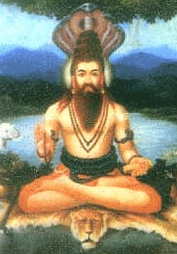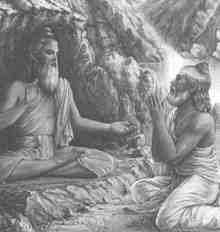SelfDefinition.Org
Greatly Inspiring Brahmacharya (Celibacy) Quotes
Compiled by Gopal Krishna

Quotes from Spiritual Scriptures

1. The Chandogya Upanishad [1] says, "Only those who (observe) brahmacharya will attain to Brahman (Supreme Reality). For them there is freedom to act as they wish in all the worlds. Now, what people call yajna (sacrifice), that is really brahmacharya. What people call worship (Ishta), that is really brahmacharya. What people call Vedic sacrifice, that is really brahmacharya. For only through brahmacharya does one understand the Atman (the Self). (8.4.3, 8.5.1-2)
[1. en.wikipedia.org/
2. The Prasnopnishad [2] stresses the same point. When six highly evolved aspirants approach sage Pippalada seeking the Highest Brahman, the Rishi tells them, "Stay here another year observing austerity, brahmacharya and faith. Then you may ask questions as you please and, if I know, I will surely explain all to you." (1.2)
[2. en.wikipedia.org/
3. Srimad Bhagavatam [3] has this to say, "The highest form of tapas (austerity) is the abstinence from sexuality and not in the performance of body-torturing rites. Heroism lies in the conquest of one's sensual, lustful nature and not in mere combativeness. And Truth is seeing God in everything and not mere factual speech." ( 1.11.18.43 )
[3. en.wikipedia.org/
4. In the Bhagavad Gita, Lord Krishna exhorts spiritual aspirants to be "fearless, serene, restrained in mind and established in the vow of continence" and meditate on Him to reach the goal. (6.14). He says that a person aspiring to enter the "Imperishable Principle" should lead a life of continence and asceticism. Such a person is assured of liberation at thetime of death. (8.11-12)
Sri Krishna also warns about the pitfalls of progressive degeneration if one does not control lust and anger. "It is lust, it is anger, born of Rajoguna, insatiable and prompting man to great sin. Know this to be the enemy in man's spiritual life. Knowledge is overcast by this eternal foe of the aspirant after knowledge. Therefore, controlling the senses at the beginning itself, slay this foul enemy, the destroyer of all knowledge and realization." (3.37-41)
5. Swami Yatiswarananda, [4, 5] a former Vice-President of the Ramakrishna Order, says, "In the higher forms of Christianity, Buddhism and Hinduism, great stress has been laid on the observance of perfect brahmacharya in thought, word and deed. You find it in the 'Sermon on the Mount', in the 'Vinaya Pitaka' of Buddhism and in the Upanishads, in the Gita and in the Bhagavatam. A socially accepted form of moral life alone is not enough for a spiritual aspirant. He must attain perfection in moral virtues, especially brahmacharya."
[4. en.wikipedia.org/wiki/
[5. en.wikipedia.org/wiki/
6. The Mahabharata: "Know that in this world there is nothing that cannot be attained by one who remains from birth to death a perfect celibate. In one person, knowledge of the four Vedas, and in another, perfect celibacy - of these, the latter is superior to the former who is wanting in celibacy."
7. Chhandogya Upanishad: "And those students who find that world of God through chastity, theirs is that heavenly country; theirs, in whatever world they are, is freedom.
8. Bhagavad Gita: Sensuality destroys life, lustre, strength, vitality, memory, wealth, great fame, holiness and devotion to the Supreme."
9. Vijay Kumar: [6] "It is only traveling on the waves of celibacy that one reaches the level of Nirvikalpa Samadhi. The awakening of Kundalini can only happen if we have celibacy under absolute control. The awakening of the Kundalini is beset with practicing absolute celibacy for a continuous period of 12 years. Mahavira [7] practiced celibacy for a continuous period of 12 years. Gautama Buddha followed, and absolute celibacy was also practiced by Jesus Christ, for reaching the status they finally achieved in life, becoming an enlightened one! The practice of absolute celibacy directly leads towards gaining enlightenment within this life. Brahmacharya Vrata does not mean sexual inactivity. It must be practiced mentally to gain purity of thought so that absolute control over the five senses and the mind can be established with shall lead one towards attaining the stage of Nirvikalpa Samadhi."
[6. Quoted at godrealized.com/celibacy.html ]
[7. Born 599 BC. https://en.wikipedia.org/wiki/Mahavira ]
10. The Yoga-Sutras packs many things into each of its verses, but reserves a separate verse for celibacy. [8] Then the scripture goes on to refer to celibacy again in other verses.
[8. Verse 2.38: "When walking in the awareness of the highest reality (brahmacharya) is firmly established, then a great strength, capacity, or vitality (virya) is acquired."]
The Great Austerity: Celibacy is actually one of the major austerities . The Yoga-Sutra lists "austerities" (tapas) among the three basic actions of yoga. (The other two activities of yoga are "Self-Study" and "Devotion to the Lord.") Austerities are given first place in the Sutra. So one truly interested in yoga and God-knowledge will be very interested in austerities. The only other austerity that is on a par with celibacy is meditation itself. Effective traditional austerities include celibacy, fasting, solitude, silence, pranayama, holding an asana, and meditation itself.
Another austerity that needs to be mentioned today: Restraining yourself from playing "fashion saddhu" and dressing yourself up in religious garb to get attention and notoriety. That would be a worthwhile austerity for some. But among all austerities, sexual continence is arguably the most important. It inaugurates profound changes in the physical and astral bodies of the aspiring yogi. Chastity dramatically improves concentration and meditation. It founds the storehouse of merit and accumulates shakti, sometimes called "ojas."
11. The Hatha Yoga Pradipika, [9, 10] key fourteenth-century text, says those who practice brahmacharya need no longer fear death.
[9. "Light on Hatha Yoga" en.wikipedia.org/wiki/
[10. Full text at sacred-texts.com ]
12. In the Mahabharata again, you will find, in the Santi Parva: "Many are the branches of Dharma, but Dama is the basis of them all'.